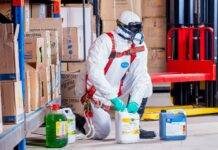
COSHH Course: Safeguarding Workplaces through Hazardous Substance Training
COSHH Course : The workplace is a dynamic environment where various substances are used daily, some of which pose risks to health and safety. Understanding and managing these risks are vital, which is why the Control of Substances Hazardous to Health (COSHH) course plays a pivotal role in ensuring workplace safety.
I. Introduction to COSHH
Defining COSHH
COSHH stands for Control of Substances Hazardous to Health, a set of regulations that dictate how substances that can harm health should be handled in the workplace.
Importance of COSHH Training
COSHH training is designed to equip individuals with the necessary knowledge to identify, assess, and control substances hazardous to health in their work environment.
II. Understanding Hazardous Substances
Types of Hazardous Substances
Hazardous substances range from chemicals and biological agents to fumes, dust, and more, all of which have the potential to cause harm.
Risks Associated
Exposure to these substances can lead to various health issues, from skin irritation to respiratory problems and even more severe conditions if not properly managed.
III. Benefits of COSHH Training
Workplace Safety
By understanding how to handle hazardous substances safely, employees contribute to a safer working environment.
Legal Compliance
COSHH training ensures that businesses adhere to legal obligations, avoiding penalties and promoting responsible practices.
IV. Components of a COSHH Course
Curriculum Overview
COSHH courses cover identification, assessment, and control of hazardous substances, along with emergency procedures.
Practical Training Sessions
Hands-on sessions provide real-life scenarios, enabling participants to apply theoretical knowledge practically.
V. Choosing the Right COSHH Course
Accreditation and Certification
Selecting accredited courses ensures credibility and meets industry standards.
Course Duration and Flexibility
Consider courses that fit organizational needs, balancing duration with comprehensive content.
VI. Implementing COSHH Guidelines
Applying Knowledge in the Workplace
Translating learned concepts into practical applications is crucial for effective risk management.
Creating a Safe Working Environment
Implementing COSHH guidelines promotes a culture of safety and well-being among employees.
VII. Importance of Regular Updates and Refreshers
Keeping Knowledge Current
Regular updates on regulations and practices prevent knowledge stagnation.
Adapting to Changes in Regulations
Staying informed about changes in COSHH regulations ensures continued compliance and safety.
VIII. Cost-Effectiveness of COSHH Training
Long-term Savings vs. Risks
Investing in proper training minimizes potential risks and associated costs, safeguarding both employees and the business.
IX. Case Studies and Success Stories
Real-life Examples of COSHH Implementation
Exploring successful implementations highlights the positive impact COSHH training has had on various businesses.
Positive Impact on Businesses
Improved safety measures often result in increased productivity and employee morale.
X. Conclusion
In conclusion, the COSHH course isn’t merely a regulatory requirement; it’s a fundamental step in ensuring workplace safety and fostering a culture of responsibility.
COSHH (Control of Substances Hazardous to Health)
Chemical Safety Toolbox Talk Meeting
Chemical Safety Basic Knowledge
FAQs
- Is COSHH training mandatory for all industries? Yes, COSHH training is essential for any industry where employees handle substances hazardous to health. It’s a legal requirement to ensure workplace safety.
- How often should COSHH training be refreshed? The frequency of refreshers depends on the nature of the work and the substances handled. Generally, it’s advisable to refresh COSHH training annually or whenever there’s a significant change in procedures or substances.
- Can online courses provide adequate COSHH training? Yes, accredited online courses can offer comprehensive COSHH training. However, practical sessions and hands-on experience are also crucial, so a blended approach might be more effective.
- What are the penalties for non-compliance with COSHH regulations? Penalties for non-compliance vary but can include fines, legal action, and potentially serious consequences if incidents occur due to negligence.
- How does COSHH training benefit small businesses? COSHH training helps small businesses maintain compliance with health and safety regulations, ensures the safety of their employees, and reduces the risk of costly incidents, thus supporting their long-term sustainability.
























